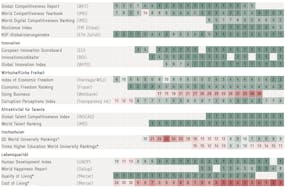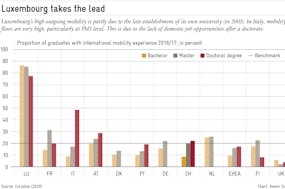This spring’s lockdown revealed local educational institutions demonstrating unexpected agility. Swiftly, most schools adapted their teaching methods, and teachers, parents, pupils and students achieved the extraordinary. In most cases, classroom teaching continued despite closed buildings.
Such creativity and will to change must be preserved for the post Corona period. In future, our education system, its institutions and people, will repeatedly face the need to adapt quickly for several reasons:
- Digitization has enabled a democratization of knowledge, and as a result, educational institutions have lost their monopoly on its dissemination. The internet offers structured information anytime, anywhere and often free of charge. The advantage no longer lies with those who “own” knowledge, but with those who make it accessible and spread it.
- Learning outside traditional educational structures has become a normal part of life. While educational qualifications have not yet lost their importance and have a signaling effect. The “do-it-yourself” mentality is gaining ground in education.
- Maintaining one’s fitness for the job market requires constant learning. Primary and secondary schools especially lay the foundations for lifelong learning. Early gaps in education are difficult to close later.

Educational institutions remain important in times of technological change, even if their offerings will change.(Mikael Kristenson, Unsplash)
For baby boomers, a successful completion of an apprenticeship or a high school diploma used to be enough for a promising professional career. Today, such qualifications are merely one step on a lifelong educational path. Thanks to the introduction of the vocational baccalaureate, dual training has become more attractive and allowed a response to the increasing demands of the labor market. More than 50 percent of the 25 to 34-year-olds living in Switzerland now hold a tertiary degree, without the feared ‘flood’ of academics setting in. The permeability of the Swiss education system, which allows for different educational careers, must be further strengthened.
The accumulation of human capital among the younger generation can be measured in particular by the increase in formal educational attainment. But the young also engage in learning informally and outside official educational structures. Social media have made this much easier. So-called ‘how-to’ videos are among the most popular on YouTube. For example, they help to explain algebra for whom classroom teaching is insufficient. And ever more universities are offering parts of their courses on MOOC (Massive Open Online Courses) platforms to an unlimited number of interested people, mostly free of charge.
Of course, “diploma inflation” must be critically examined. What counts in the labor market should be less a question of what qualification a person possesses than what skills they offer. Personal initiative in lifelong learning should be worthwhile even without a formal degree.
However, educational institutions have not come to an end. Public sector schools lay the foundation for lifelong learning and so must adapt constantly to new requirements. With the Corona pandemic, schools have seen a real push to further digitalization. This euphoria often obscures the fact that digitization is based on one of the most important scientific disciplines of the new millennium: computer science. Despite Switzerland’s much vaunted new “curriculum 21”, computer science is still not adequately represented. Improvements must be made here so that not only “competent” consumers, but also enlightened producers and citizens emerge.
Ultimately, Switzerland’s federal structure has contributed significantly to corona protection measures being so well cushioned. Federalism allows taking individual starting positions into account. Likewise, the relatively high degree of institutional autonomy contributes to the adaptability of the educational system. The corona pandemic has highlighted the importance of federalism and autonomy for rapid responses and the potential for change inherent in Swiss educational institutions. That favorable starting point must be maintained. All that is needed now is the courage to take new paths, even in times of crisis.





